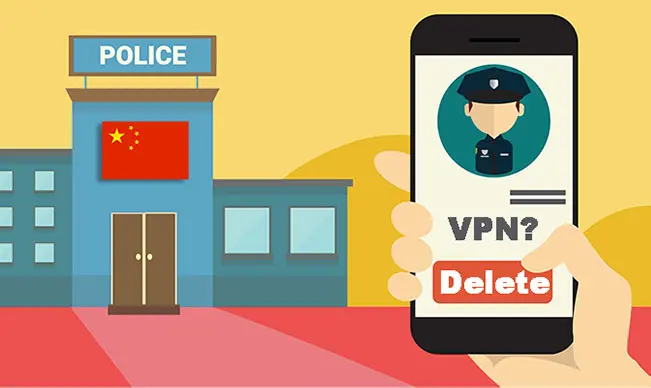For those living in China, internet censorship and geoblocked content are simply part of daily life. A virtual private network isn’t a luxury, it’s a necessity. The problem, however, is that there’s a lot of false information about the best VPN for China from people who have never lived here. This is what you need to know.

Spoiler alert!
There is no best VPN for China and everyone else who says otherwise, I can guarantee you that they’ve never lived in China.
So why should listen to what I have to say?
Well, for one, I’ve lived in China for more than a decade and have used at least 20 different VPNs during that time.
But more importantly, my experience all across China has given me a unique perspective and understanding of how the internet in China works. And there’s one thing I know for sure:
Trying to give a “one size fits all” recommendation for the best China VPN is pointless. It’s a moving target.
For this reason, instead of just listing off a few VPN services, collecting my commission and being on my way, I want to actually educate you so you can make an informed decision. This includes covering things like:
Hopefully you’ll be better prepared for the frustrating censorship that happens in China and the constant battle you’ll be waging as an expat here.
Note: Some of the links in this article may be affiliate links, which means that at no extra cost to you, I may be compensated if you choose to use one of the services listed. I only recommend what I personally have used, and I appreciate your support!
History of Censorship in China
I first moved to China in 2006, back in the “glory days” when social media was still innocent, the iPhone hadn’t yet been launched and the internet was still open and accessible in China.
At least, it was mostly accessible.
It was in the early 2000s that China’s Ministry of Information began to censor the internet. It officially began with China’s Golden Shield Project in 2006, something that is now referred to as The Great Firewall of China.
It was barely noticeable at first, mainly just porn websites and a few blatantly anti-Chinese websites.
But then in 2009 everything changed. China had finished hosting the Olympics and was no longer under the global microscope. They were emboldened after some social unrest in the western region of Xinjiang and took swift action to block YouTube in March, followed by Facebook, Twitter and others in July.
From 2009 on, censorship in China became so widespread that the question changed from “What is blocked in China?” to “What isn’t blocked in China?”.
Why Does China Censor the Internet?
China says they censor the internet for the protection of their population, and in some rare cases I can see the merits of their argument.
The truth, however, is that censorship by the Chinese Communist government is all about one thing:
Control.
If they can control the flow of easily available information, they can maintain their position of power in Beijing. It’s as simple as that.
But the fact is that VPNs are still extremely popular among younger Chinese people. The savvy generation of kids knows that all the fun videos, games and real news is blocked, and a VPN is the only way to get to it.
Is a VPN Legal in China?
So with this in mind, the most common question I get about VPNs in China is this: Is it legal to use a VPN in China?
I’ll answer this question with a story from my own experience.
A few years ago, while I lived in the sensitive western region of Xinjiang, my phone that I had been using for quite some time just stopped working. I tried topping up my balance and restarting the phone, but nothing got it to work.
I took the phone into China Unicom, my cellular provider, and was completely shocked when they told me that my service had been cut by the local authorities and I would need to visit the police to get it restarted.

When I got to the police station, they went through my phone and not only deleted all my VPNs, but also apps like Skype, Viber, Signal and others.
After they were done, my phone service was reactivated but, as a test, when I left the station I immediately reinstalled all the apps and VPNs to see if my service would be cut again.
It never was.
Will You Get in Trouble for Using a VPN?
I tell you this story as basically a worst-case scenario. I’ve never heard of a foreigner getting seriously punished for using a VPN service, although with China anything is possible in the future.
I can’t say with certainty whether it’s illegal to use a VPN in China because China’s laws and policies are purposefully vague. If China doesn’t like you, they’ll find a way to nail you for something..
But if you just want to use a VPN to access your email, watch YouTube or stream Netflix, countless expats in China will tell you the same thing.
You’re going to be fine.
Why There is No “Best VPN” for China
Let’s jump into some practical advice here. What is the best VPN for China?
The answer is as simple as it is vague.
It depends.
You see, we all tend to think that China’s internet runs to a single choke point where authorities in Beijing decide what is blocked and what is not.
But this isn’t true.
China’s internet is censored on a local and enterprise level, with Beijing sending out directives on what should be blocked. It’s up to the Chinese social media companies to censor themselves and local governments in cities across China also follow these directives from Beijing and sometimes put additional censorship in place just for good measure.
I’ve had the experience of traveling between cities where an app on my phone was working in one place and then all of the sudden it stopped working in another city. The local government in one city had decided to block access to this communication app when the other city hadn’t.
This is incredibly important to understand when it comes to VPNs in China, because what works in one place in the country might not work in another. I’ve had people tell me that “such and such VPN works great in Shanghai”, and when I tried it in Xinjiang, I could never connect.
Using a VPN in China (3-Step Strategy)
If you want to connect to a VPN in China, there’s a simple 3-step strategy that I recommend you use.
It is possible to do this from within China, but if at all possible, I highly recommend you do this prior to your arrival in China. As you can imagine, China censors all VPN websites, which makes this much harder from within the borders of the country.
Step 1: Download Multiple VPN Services
First, I download multiple VPN services that all offer a 30-day money back guarantee. I also prefer services that have a strong reputation and a history of working well in China (since it requires a lot of work to play the cat-and-mouse game with the censors).
A few of the ones I use that fit this criteria include:
Each of these VPNs has historically worked well in China, they’ve fought through a number of VPN crackdowns over the past decade and, at least in my experience, they have good customer support.
Step 2: Test Each VPN in Your China Location
Once you’re settled in China, spend a couple weeks testing each VPN. You’ll find that some probably connect easier than others or have better speeds.
It’s important to try these connections on different devices.
In my experience, sometimes a VPN service connects well on my laptop but I can never seem to get it to work on my mobile device.
Perhaps it’s because of my phone, perhaps it’s because of the mobile service provider…who knows. But it’s important to take all of this into account as you work to answer the most important question:
Which China VPN works best for me in my location, using my devices?
Step 3: Get Refunds on Unused VPNs
The last thing you do is keep the one or two that you like most and get refunds on the rest.
I tend to keep at least two active VPN accounts while I’m in China, because there are times when one experiences a crackdown and I still need consistent access to the open internet.
Final Thoughts on VPNs in China
I’m not going to sit here and tell you that one VPN is always the best in China because that’s never been my experience. I think most other foreigners would agree.
Ask some other foreigners in the area where you’ll live in China what they use. Try a number of different services to find what works best for you.
And if at all possible, download and sign up for these VPNs before you leave for China because I can tell you from experience that it’s quite hard to do so once you’re in China.
Cause, as you might expect, China censors VPN websites too.
Be sure to subscribe to the All Things Secured YouTube channel!










